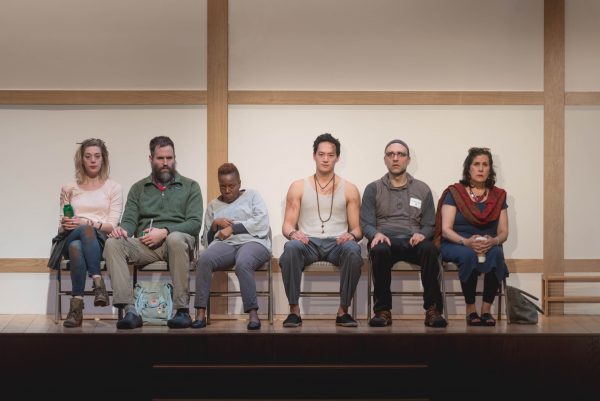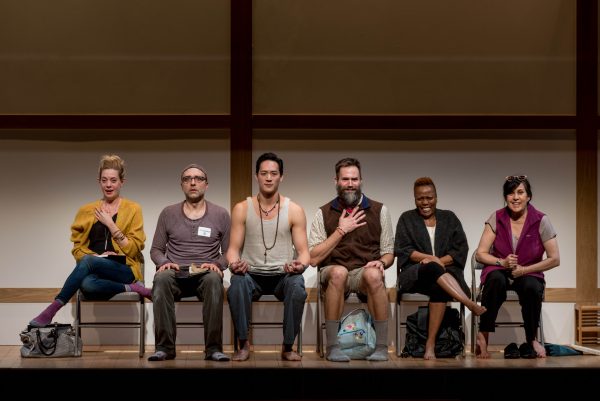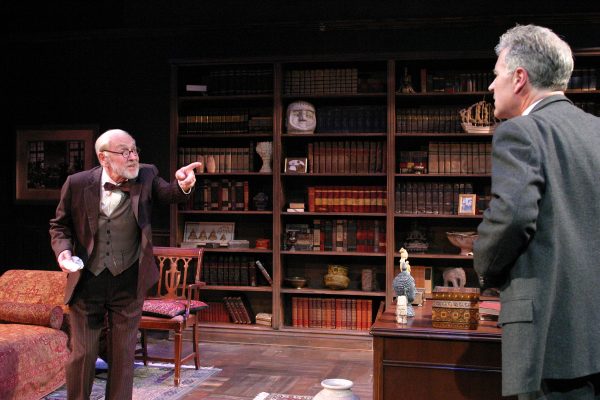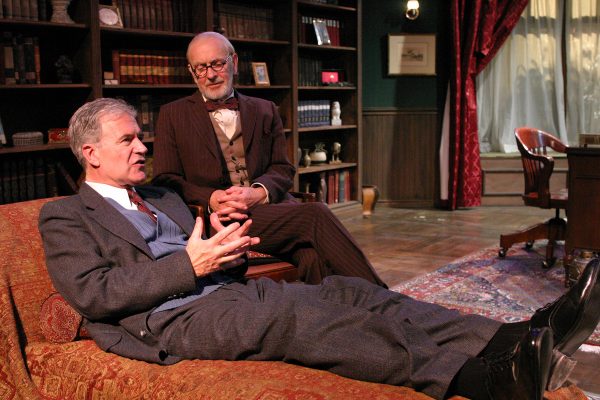[alert type=alert-white ]Please consider making a tax-deductible donation now so we can keep publishing strong creative voices.[/alert]
There was plenty to wonder about entering The Broad Stage last Saturday for a performance of the touring Ars Nova production of Small Mouth Sounds. The show came with good notices in its pocket, but the production is new to Los Angeles. The premise consists of a silent retreat for overstressed people. Silent in the theatre can be a dicey word. Beyond Samuel Beckett, can anyone get away with silent theatre?
Time to find out. As it turned out, there was no need to worry. Playwright Bess Wohl’s experiment with silence and director Rachel Chavkin’s masterful staging are a major surprise. Major as in laugh-out-loud satiric, sad, savvy and deeply wise.
That’s a mouthful and, theatrically speaking, no small feat, given that the six stragglers who file into this stark and unwelcoming space for a multi-day retreat are strangers cautioned by their Teacher — a measured disembodied voice, exquisitely delivered over a loudspeaker by Orville Mendoza — that they are not to speak to one another. No cell phones, iPads, tablets, computers or other electronic devices permitted. Pencil and paper, yes. Only the invisible Teacher gets to speak. Sometimes in confounding ways.
How will we get to know these individuals? They are markedly different one from another in appearance, costume, behavior and quirks. They don’t know any more about what to expect than we do. Can they overcome such limitations? Can the play?
Amazingly, they do. More amazingly, we do. Communication is eloquently confined to the raising of an eyebrow, the casting of a look, attempting a smile, a kind gesture, shedding a few tears, offering a hand, recoiling in dismay. Yet the cause and effect in each case is unmistakable, both to the audience and to those willing and often bewildered participants on stage. It is remarkable how fast we accommodate to the body language as disappointment, anger, shock, amusement or irritation grow evident. Words not needed.

What helps to get us from one day to the next are Andrew Schneider’s video projections of the stormy weather seen through the high windows of Laura Jellinek’s clinically neutral set, and Stowe Nelson’s rumbling sound design. What doesn’t help is that, except for the Teacher on the loudspeaker, when the actors do speak (rarely), they’re not easy to hear. Is it the acoustics, the absence of body mics or vocal projection? Hard to tell, but at Saturday’s matinee, hearing was a problem.
The invisible Teacher is humanized by his words — his idiosyncrasies, digressions, even conundrums. And the personalities of the silent participants waste little time becoming obvious. We know at once that Joan (Socorro Santiago) and Judy (Cherene Snow) are an item of some lengthy standing; that the preening and impossibly tall and athletic Rodney (Edward Chin-Lyn) is not as perfect as he seems, even if the messily scattered Alicia (an irresistible Brenna Palughi) would like to think he is; that the nerdy Ned (Ben Beckley), is full of misery and won’t remove his skull cap for what he considers a good reason, and that the benevolent Jan (Connor Barrett) is a smiling mystery, perhaps because he’s hiding something that stands in no one’s way but his own.
These characters are all portrayed by first rank actors, each to be commended for the flawless ensemble. But the most distinguished work is that of director Chavkin, who introduces us to these people with deliberation. She clearly worked with the playwright to give the script the time it demands to draw an audience into the lives of this half-dozen men and women, providing plenty of color and nuance without words.

That is an astonishing achievement, even if not entirely flawless. Ned’s rambling question for the Teacher, somewhere in the middle of the play, is more an interruption than a tool. Its purpose — to deliver a piece of information the audience should know — could be achieved with fewer words; the Teacher has warned, after all, about not wanting to hear anybody’s entire life story. Ned’s body language has already told us a good deal about him. We already know he’s the kind of sad sack destined to bore people to death with his tale of woe.
The week is eventful, but… the theatrical event is over once the Teacher has released his students with an abrupt goodbye. Anything more only delays the play’s conclusion. Yet in an apparent desire to complete these portraits with a small final flourish from each one, Wohl provides brief vignettes at the end that add up to several false endings. Most of what follows — except for the image of Jan, frozen in his chair, unsure where to go — merely feels tacked on.
Bess Wohl, you own this play. Trust that, at that point, it has skillfully told us everything that matters about these frail and fascinating human beings. No postscripts needed.
§§§§§§

In sharp contrast to the silent treatment of Small Mouth Sounds, the production of Mark St, Germain’s Freud’s Last Session at the Odyssey Theatre is all talk. Lots of it. It pours out of the mouths of two well-known figures of the 20th century: Sigmund Freud, an avowed atheist, and C.S. Lewis, the wavering believer. Much of the conversation focuses on God — who’s right, who’s wrong — heightened by the fact that it takes place in 1939 on the fateful September day when World War II broke out.
It’s easy to see the temptation of writing such a play. Think of the wealth of ideas, the thoughtful aphoristic phrases and contrasting observations coming from these two prominent men, all ripe and ready for the plucking.
So it’s disappointing that, instead of doing the heavy lifting for the playwright by virtue of their reputations and opposing views, these two men’s imagined meeting in Freud’s office (in reality they never met), feels as flat and intractable as two “authorities” at a dinner party in a bragging contest to see which one can better outshine the other.

Perhaps it’s because the circumstance of the meeting is poorly invented (the men essentially agree to disagree). The production spares no effort. It pays meticulous attention to period and background. It takes place in Freud’s elegant office, studiously designed by Pete Hickok. But despite director Robert Mandel’s attempts to inject momentum, it cannot overcome the script’s absence of thrust.
Nothing much happens in that hour and 20 minutes, except for talk, Freud’s nursing of a cancerous jaw, Lewis’ solicitude, Hitler’s march on Poland and incoming and outgoing phone calls (a static device). No matter how fiercely these strong actors engage in vocal calisthenics, the feisty Martin Rayner as Freud, and the more reserved and elitist Martyn Stanbridge as Lewis, cannot compensate for the lack of motivation. Talk alone does not make a play.

The juxtaposition of Freud’s Last Session’s chatter and Small Mouth Sounds’ stillness offers a reminder of the late French actor Louis Jouvet’s assertion that the golden rule of the theatre is that there is no golden rule.
Top image:l-r: Brenna Palughi (Alicia), Ben Beckley (Ned), Edward Chin-Lyn (Rodney), Connor Barrett (Jan), Cherene Snow (Judy), Socorro Santiago (Joan) in Small Mouth Sounds at The Broad Stage. Photo by Ben Gibbs.
WHAT: Small Mouth Sounds
WHERE: The Broad Stage,1310 11th St., Santa Monica, CA 90401.
WHEN: Thursdays-Fridays, 7:30pm; Saturday & Sunday at 2:00pm & 7:30pm. No 7:30 performance, Jan 28. Ends Jan 28.
HOW: Tickets start at $45 (subject to change), available at www.thebroadstage.org or 310.434.3200 or in person at the theatre box office three hours prior to performance. Limited free parking is available.
WHAT: Freud’s Last Session
WHERE: Odyssey Theatres, 2055 S. Sepulveda Blvd., Los Angeles CA 90025.
WHEN: Wednesdays, 8pm, Jan. 24 & Feb. 21 only; Thursdays, 8pm, Feb. 8 & Mar 1 only; Fridays 8pm, Jan. 19, 26, Feb 2, 9, 16, 23 & Mar 2; Saturdays 8pm, Jan 20, 27, Feb 3, 10, 17, 24 & Mar 3; Sundays 2pm Jan. 21, 28, Feb 4, 11, 18, 25, & Mar 4. Ends March 4.
HOW: Tickets $30-$35, available at www.OdysseyTheatre.com or at 310.477.2055 ext. 2. Discounted tickets available for seniors, students and patrons under 30. “Tix for $10” available only Jan. 24, Feb. 2 & March 1.
